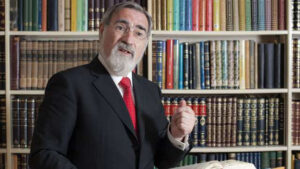Home » Commentary » Opinion » Vale Jonathan Sacks
· Ideas@TheCentre
 With the death of Rabbi Lord Sacks over the weekend, the world has lost a leading religious intellectual figure who could communicate complex truths in simple terms.
With the death of Rabbi Lord Sacks over the weekend, the world has lost a leading religious intellectual figure who could communicate complex truths in simple terms.
Jonathan Sacks came to prominence when, at the age of 43, he was appointed to the office of Chief Rabbi of the United Hebrew Congregations of the Commonwealth; a position he held until 2013.
At a time when many were lamenting — or celebrating — the demise of religious faith in the West, Sacks took a strong position defending religion, arguing for its continued importance in public life.
In particular, Sacks held that religion contributed significantly to debates about human dignity, about how best to honour human life, and about how to build a just and equitable society.
In doing so, he demonstrated that, far from being marginal and irrelevant to modern life, religion was integral to human society and was able to confer meaning where science sought only to explain.
But he recognized the danger posed by conflict between (and sometimes within) religious traditions, and he confronted many of the challenges presented by multiculturalism.
One particular challenge is the threat posed by religious violence, an issue Sacks addressed forcefully in his book, Not in God’s Name: Confronting Religious Violence, published in 2015.
The threat of conflict generated by religious differences is real and remains with us. Slayings by Islamists and attacks launched against Jews and Muslims by white supremacists remind us of this.
He urged those from different faith traditions to remember the common bond of humanity that we share, and to see religion as a means for building up human community rather than tearing it down.
In Australia, the public sphere has become very fractious in recent times making respectful engagement between opposing voices harder – especially when those voices include religious ones.
For Sacks, the public face of religion is to be understood as “a consecration of the bonds that connect us [and as that which] sustains community and helps reweave the torn fabric of society.”
Jonathan Sacks was a man of great learning and remarkable insight whose prophetic voice carried across many of the divisions in our society. His life bore witness to all the truths for which he stood.
Peter Kurti is the author of Sacred & Profane: Faith and Belief in a Secular Society published by Connor Court.
Vale Jonathan Sacks